- Home
- Muriel Spark
The Finishing School Page 4
The Finishing School Read online
Page 4
That repetitive use of “one” nettled Nina. “I suppose one does,” she said.
Chris went for a walk after dinner, dutifully reporting the fact to Rowland.
At the house of the violin everything was dark.
Nonetheless Chris went up to the door and pressed the bell. After a while there appeared from round the side of the house the same elderly caretaker.
“You are looking for M’selle and Monsieur Brown?”
“That’s right. I’d like to see them.”
“They left an hour ago, or an hour and a half . . .”
“Oh, will they be back?”
“One never knows. I have no information. They received your last message.”
“Yes, I know.”
“Do you find,” said Rowland to Chris, “that at a certain point your characters are taking over and living a life of their own?”
“I don’t know what you mean,” Chris said.
“I mean, once you have created the characters, don’t you sort of dream of them or really dream of them so that they come to you and say ‘Hey, I didn’t say that.’ ”
“No,” said Chris.
“Your characters don’t live their own lives?”
“No, they live the lives I give them.”
“They don’t take over? With me, the characters take over.”
“I’m in full control,” Chris said. “I never thought they could have another life but what I provide on the typed page. Perhaps the readers, later on, will absorb them in an extended imagination, but I don’t. Nobody in my book so far could cross the road unless I make them do it.”
“How strange. Most creative writers and novelists feel quite the opposite. That’s the usual experience. That’s how I feel, too, with my characters, I feel bound to say.”
“Well, I’m a beginner,” Chris said.
Rowland could have stabbed the boy for his modesty and calm. He walked away. He left Chris alone for two days, speaking to him only briefly at mealtimes. But Rowland was off his food, he wasn’t well.
“Every writer gets writer’s block,” Nina said. “That should be an essential theme of one of your creative writing talks. There must be a known way to deal with the situation.”
“I haven’t got writer’s block,” Rowland said. “It’s only that my characters are so real, so very real. They have souls. If you are writing a novel from the heart you have to deal with hearts and souls. The people you create are people. You can’t control people just like that. Chris is writing a novel where he controls people.”
“Oh leave Chris out of it. What do you know about him, after all? In five years’ time he might be working in a private bank, managing a sandwich company, teaching history, anything.”
“He told me he controls his characters. He creates them and they have no lives of their own.”
“Well,” said Nina, “they haven’t of course.”
“He doesn’t see them as flesh and blood, as human.”
“Well,” said Nina more emphatically, “. . . flesh and blood—the author can always kill off a character. It isn’t a crime. Chris is writing about historical figures, anyway. They killed each other, those characters. What are you worried about?”
“His way of going on with his book makes my No. 3 creative writing lecture look silly.”
“You could change it.”
“Perhaps I’ll modify it. How does he mean, he has control of his characters? He didn’t create Mary Queen of Scots and her little musician. They’re taken out of history, aren’t they? They’re ready-made.”
“I don’t think so, Rowland,” said Nina. “From the bit we’ve read, his Mary Queen of Scots, his Darnley and Rizzio, are his. He’s already said to me that he doesn’t care a damn if Bonivard was probably an invalid after spending six years in the Castle of Chillon. Chris said, ‘He’s as healthy as I make him.’ The only thing he wants to be precise about is the state of the weather on the day that Rizzio’s brother came to Geneva to see Bonivard, and the weather when Darnley was murdered, and always, always, the weather. He says it gives an authentic background.”
“Quite right, I advised that myself, in my second lecture. The weather—”
“So you did. Yes, he must have been listening after all. I always think Chris looks vague when one is teaching.”
“An awfully nice boy,” Rowland said. In his tone was a touch of regret, as if Chris had been an awfully nice dog that however, for some overwhelming reason, had to be taken to the vet to be put down.
8
At College Sunrise, unlike at other, larger, schools of the time in Switzerland, the end of the school year was in mid-December instead of in the summer. Rowland and Nina always arranged a large dinner party and dance for the students, friends and parents (at their willing expense), with school-prize givings part of the show. This year it was to be held at the nearby five-star hotel. Nina, knowing that the coming term would be full of normal work, was using the school holidays to make preliminary arrangements for the year’s final feast.
It was while discussing details of the package with the amiable manager that a thought suddenly struck her which she put at the back of her head to make way for the business on hand. However, on the way home she came back to her thought: I’m running the school alone. Rowland might as well be one of the students. He is hardly one of the staff. He does nothing but his creative writing class now, and hardly that. Originally Rowland had taken Social History, Modern Art and Photography. It was all textbook stuff. Nina found it quite simple to take on these classes when Rowland became immersed more and more in his novel. Simple, but not easy. She had far too much to do. The school fees were very high and the students were entitled to something like what their parents paid for.
At home, Rowland was in the study frowning over his novel. Nina had made up her mind to tell Rowland right away that she was doing much more than her fair share of the school, that she felt overburdened. She sat down at her desk, ready to speak, and she did; but her words that came out were:
“You fancy Mary Foot, don’t you?”
“Oh, don’t start all that again. Mary’s shy. I had to try and bring her out.”
“Well, I think she prefers me to you, if you want an honest opinion.”
“At this moment,” he said, “I am not taking opinions. I am writing a book.”
“Or is it Pansy?” she said. “Maybe it’s Pansy who keeps you awake.”
Their row blew over, all about something quite different, as it was, from the main cause.
In any case, it was always their quiet, working boarder, Chris, who occupied Rowland’s mind. Everything else was peripheral. Rowland told himself that the novel Chris was rapidly producing would be, at best, a popular, not an artistic, success. The fact that Chris was only seventeen—perhaps, when and if the book should be published, eighteen, would stand in his favor. At eighteen a successful historical novelist . . .
Rowland wrote:
“The two visitors, young aunt and somewhat older nephew, walked sedately up the path.” He took out “sedately” and put in “carelessly.” Then he took that out and put in “casually.” Then he wrote, “She still had a slight limp.”
But she had been looking for Chris, anyhow. Red-haired Chris.
Rowland, before he had graduated from Oxford, had already written a play for the National Theatre which was a young-person success. It was followed by the offer of play after play by Rowland which, according to his agents, “you couldn’t give away.” He changed agents. They still “couldn’t give away” Rowland’s stuff.
His marriage to Nina, and the help of a good legacy, put his nerves to rights for the time being. Their itinerant finishing schools had been satisfying. And now, this lust of Rowland’s to write a novel. He was sure he could do it. He remembered the days, eight years ago, when he had achieved the play, and its reception, a month of performances and good critics talking about his future. I am not yet thirty, he reflected. I can make it happen again. A novel
has a beginning, a middle and an end. So said Aristotle and so he had advised his creative writing class. A beginning, a middle and an end. Chris had said, “Do you need to begin at the beginning and end at the end? Can’t a writer begin in the middle?”
“That has been tried quite often,” Rowland replied, “but it tends toward confusion.”
Chris didn’t seem to care about this aspect. He seemed to have a built-in sense of narrative architecture and balance.
“Too much individualism,” thought Rowland. “He is impeding me. I wish he could peacefully die in his sleep.”
I am awfully young, thought Nina, to be tied to a man who is married to a novel. Or perhaps engaged to a novel as it isn’t yet real. She longed for Rowland to become Master of an Oxford or Cambridge college. She wanted to be married to a scholar. She had thought he was a playwright when she had married him; that didn’t last. But she knew he could never settle to any sort of scholarship. In fact, he was a very good teacher. He got good results, of which Chris was an example. Rowland’s novel, she thought, was threatening to break up the school. I am too young at twenty-six to be a wife-psychiatrist, she thought. Let him think of, let him analyze, me. I should have married a scholar. (Eventually Nina, herself, was to become an art historian, but that was after great effort, and after time ahead . . .) Meanwhile at College Sunrise, she was saying to herself, I am married to a state of mind. She decided to tell Rowland she was bored with his novel, but the words that came out were, “I think Chris went looking for Israel and Giovanna. I wonder if he saw them?”
Chris pondered on the nature of jealousy. He was thinking of Darnley’s fierce and primitive jealousy of Rizzio, his wife’s favorite, her musician, her confidential friend. In his life he had not yet experienced jealousy at work, although he knew the sensation, and could recognize it in others. He had sometimes envied other boys, and recognized the feeling as a sort of admiration. He knew what it was to want what others had and that he had not, such as a stable family life. And Chris also understood that when it came to looking closely at the thing or condition desired (such as other children’s “stable family life”) in fact it didn’t seem so very desirable, if indeed it existed at all.
What is jealousy? Jealousy is to say, what you have got is mine, it is mine, it is mine? Not quite. It is to say, I hate you because you have got what I have not got and desire. I want to be me, myself, but in your position, with your opportunities, your fascination, your looks, your abilities, your spiritual good.
Chris, like any of us, would have been astonished if he had known that Rowland, through jealousy, had thought with some tormented satisfaction of Chris dying in his sleep.
College Sunrise was decently but sparsely furnished, with a predominance of good modern Swedish pinewood. Throughout the house there was a minimum of curtains and cushions. The students stuck posters on their bedroom walls according to their tastes and the bookshelves contained many objects besides books, their private property, including bottles of bath lotion, piles of CDs, wooden carvings, shells, ceramic mugs. The beds were covered with colored quilts. In the public rooms, as in the bedrooms, there were no carpets. The floors were made of large dark paving tiles, kept in a fairly shiny condition.
The mobile quality of the school was facilitated by this austerity. Visitors from outside found it unaccountably desirable: “Oh, if only one could always live like this, so calm, so uncluttered, so clean.” It was moveable and cleanable. Nina and Rowland had planned it precisely for this purpose. But Nina sometimes longed for a less functional environment, for rugs and vases of flower arrangements. She had one comfortable armchair to herself, in the study she shared with Rowland.
She curled up in it while reading aloud a letter that had made her very cheerful. It was from Pansy Leghorn’s mother. The girl had left the Cambridge summer course after four days, finding it far too “bourgeois” after College Sunrise.
“I can’t tell you,” she read aloud to Rowland, “the difference in Leg after her two terms with you. She used to be so stiff and goody-goody, all Girl Guide and Sunday school. I thought she would end up as a clerk in the post office or a woman priest. She actually wore golf socks over her stockings and oh my God those white blouses. But now I assure you, Ms. Mahler, you have done wonders for Leg. She has painted the kitchen ceiling green. (The paint got into our lunch, our daily was livid) and she wears skintight jeans and skirts up to here. You must know she looks lovely now . . .” Nina stopped reading. “Are you listening, Ro?” Rowland smiled at her. “Don’t I get any of the credit?”
“In fact you do. Listen: ‘Mr. Mahler’s course in writing has really got Leg thinking. She took a bunch of newspaper clippings, jumbled them up, took the fifth word out of every printed line and made a fantastic poem. That’s freedom of expression, Mum, she said. And she said you’ll never guess how it makes you feel free just to put those words together like that. There’s a great meaning when you leave out the grammatical factor. She says Rowland says it’s not what you put in it’s what you leave out, and it’s the silences rather than the sound. I am so grateful for what you have done for Leg, Mr. Mahler. She’s a totally different person. She cut short that summer course at Cambridge of her own free will at her own discretion entirely and I admire her for it. They were teaching that pain in the neck (Leg calls it pain in the ass) George Eliot with the video shows from the BBC production. Leg said that after Mr. Mahler’s Madame Miss World Bovary she simply couldn’t sit there taking in the point about the moral dilemma. The other students were nonprofitable to be with, all leadership and laptops . . .’ —Of course,” Nina said, “Leg’s mother lives in dire wealth.”
“People like her enthuse about everything. But it’s true we’re a great school,” Rowland said.
“It’s so true,” said Nina. “You really don’t need to write a novel. Don’t you feel you’re one of those people who can get by without writing a novel?”
“No.”
9
It was well advanced into September, the last term of the College Sunrise year. All nine students were settled in again. We find, now, Nina, taking one of her casual afternoon comme il faut talks, as she called them. Five students lolled around Nina in the large sitting room: Lionel Haas, Princess Tilly, Lisa Orlando, Pallas Kapelas and Joan Archer.
“In case you are thinking of getting a job at the United Nations,” Nina told them, “I have picked up a bit of information which may be useful, even vital to you. A senior member of the U.N. Secretariat passed it on to me especially for you young people. First, if you, as a U.N. employee, are chased by an elephant stand still and wave a white handkerchief. This confuses the elephant’s legs. Second, if chased by a large python, run away in a zigzag movement, as a python can’t coordinate its head with its tail. If you have no time to run away, sit down with your back to a tree and spread your legs. The python will hesitate, not knowing which leg to begin with. Get out your knife and cut its head off.”
“Suppose there isn’t a tree to lean against?” Lionel said.
“I’ve thought of that,” said Nina, “but I haven’t come up with an answer.”
Célestine came in with a large tray of tea and fresh-baked biscuits. She was thin as a wire with black tights and top. Her yellow, bright, hairdresser-done hair fell evenly round her shoulders from a strictly black parting. She and her sister, Elaine, had originated in Marseilles. They both had thin shapes and sharp, dark, buttonlike eyes, although Elaine had kept her hair dark. Everyone knew that Célestine was Chris’s girl, but nobody, including Nina, was quite sure about Elaine, the older sister, who had opportunities to sleep with Rowland. Did she take them?
Nina often wondered about this, but did not bother unduly. With Elaine teaching French and coping with the computer, and Célestine doing the wonderful cooking, Nina left well alone. Without the wiry girls with their spidery legs what would the school have done?
Célestine spread out the cups and saucers and the plates of biscuits which began to disappear ev
en as she did so. One of the girls poured the tea, another handed round the cups. All was right with the world.
All was right with the world for Chris. He now ignored all classes, lessons, lectures of any sort. He knew that Nina and Rowland couldn’t afford to send him away from the school, and in any case he also knew he had Nina’s affection. As to Rowland, he continued to sense an unnatural curiosity bearing in on his actions, particularly his writings. Chris was quite sophisticated enough to question in his thoughts if this invasive interest of Rowland’s was sexual. He decided, perhaps it was, basically, in the sense that sex is basic, but that Rowland had no actual sexual motive or intention. Rowland’s interest in Chris was developed, mature, complex. In realizing this, Chris was flattered, and thought better of himself than was warranted. For his book, he did not feel it necessary to follow the historians in every small particular. He was quite capable of making history work for him, his plot, his characters. To Chris, those six years of Bonivard’s imprisonment at Chillon, from 1530 to 1536, had turned him into a socialist of his time. Well, why not? This made him all the more amenable, in his advanced age, to turn a benevolent gaze on the young Jacopo Rizzio who came to remind him of their meetings at the ambassadorial court of Savoy and other places, when David Rizzio was alive. Bonivard was seen to recall David’s musical talents, his diplomatic abilities and charm, and was infuriated against the Scottish Lord Darnley (“leader of the powerful Scottish establishment and husband of the Queen”). Bonivard promised Jacopo help: men, munitions, money, horses and brains adept at intrigue. They would cross to Scotland secretly, silently, arrange a mass of explosives and blow up Darnley.
And the Queen, Mary Queen of Scots? Chris pondered deeply whether to make her, too, a socialist at heart. In which case she would be a justified part of the plot. Or was she completely innocent of the murder, but still a leader of the Scottish establishment? Chris felt that Bonivard would have sympathized with the Queen, in the light of her ultimate imprisonment by Queen Elizabeth in England. It had lasted far longer than his, and ended tragically. Chris felt he had to make Mary a rebel, on the side of the victimized Rizzio faction, and certainly, even the straight history books bore witness to Mary’s distress on the brutal massacre of her servant. How to prove she was a rebel at heart, socially speaking? Chris decided not to explain this factor.

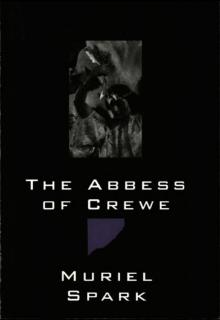 The Abbess of Crewe: A Modern Morality Tale
The Abbess of Crewe: A Modern Morality Tale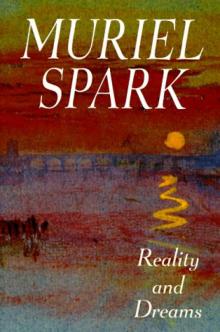 Reality and Dreams
Reality and Dreams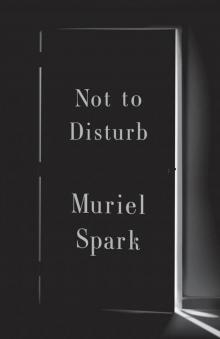 Not to Disturb
Not to Disturb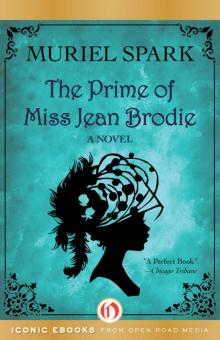 The Prime of Miss Jean Brodie
The Prime of Miss Jean Brodie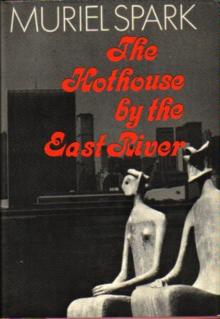 The Hothouse by the East River
The Hothouse by the East River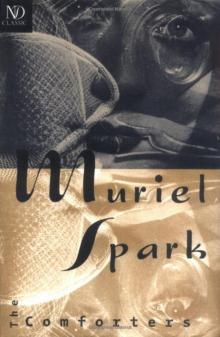 The Comforters
The Comforters (1958) Robinson
(1958) Robinson Unknown
Unknown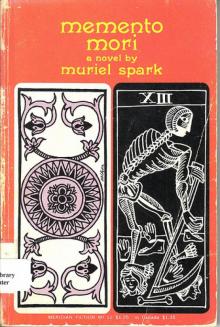 Memento Mori
Memento Mori The Finishing School
The Finishing School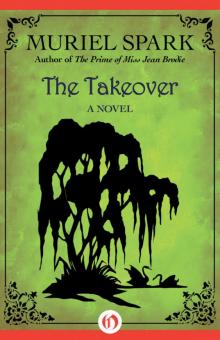 The Takeover
The Takeover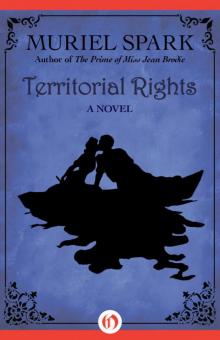 Territorial Rights
Territorial Rights The Complete Short Stories
The Complete Short Stories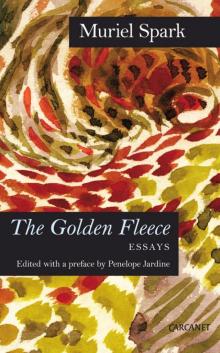 The Golden Fleece: Essays
The Golden Fleece: Essays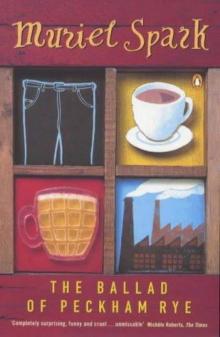 The Ballad of Peckham Rye
The Ballad of Peckham Rye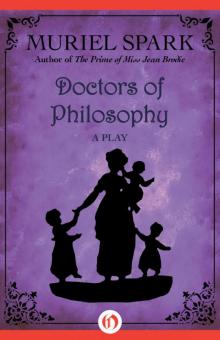 Doctors of Philosophy: A Play
Doctors of Philosophy: A Play The Mandelbaum Gate
The Mandelbaum Gate Loitering With Intent
Loitering With Intent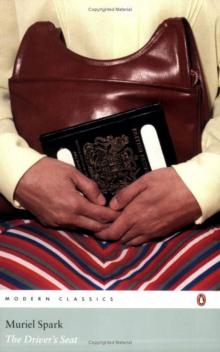 The Driver's Seat
The Driver's Seat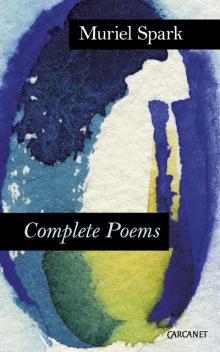 Complete Poems: Muriel Spark
Complete Poems: Muriel Spark Symposium
Symposium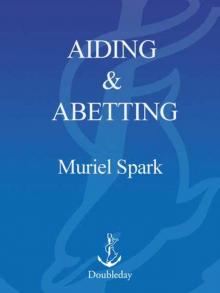 Aiding and Abetting
Aiding and Abetting The Golden Fleece
The Golden Fleece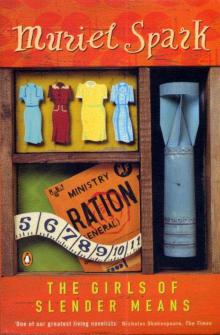 The Girls of Slender Means
The Girls of Slender Means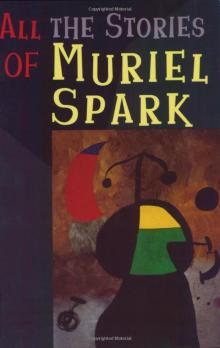 Alice Long’s Dachshunds
Alice Long’s Dachshunds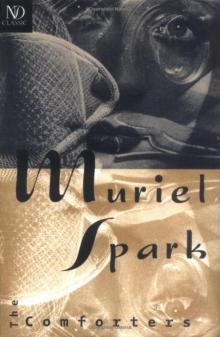 (1954) The Comforters
(1954) The Comforters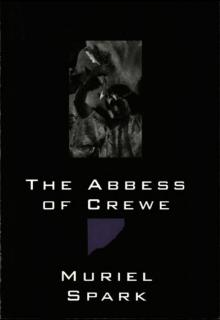 The Abbess of Crewe
The Abbess of Crewe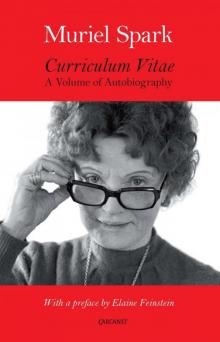 Curriculum Vitae
Curriculum Vitae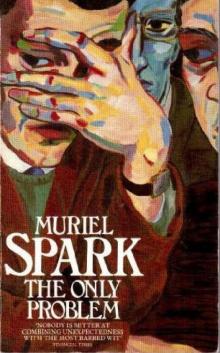 The Only Problem
The Only Problem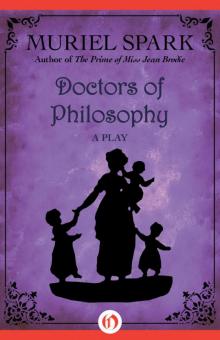 Doctors of Philosophy
Doctors of Philosophy